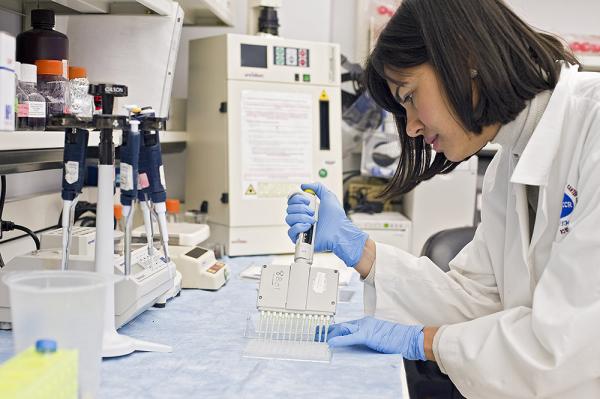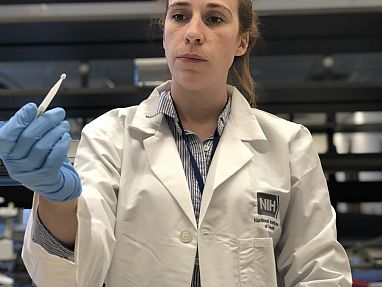A Multi-Front Effort to Combat Coronavirus
IRP Research Examines Pandemic From All Angles

IRP researchers are applying their diverse skillsets to studying the many different facets of COVID-19’s effects on our health and society.
The sheer number of labs and wide variety of scientific perspectives in the IRP make it particularly well-suited to combating a disease like COVID-19, which is affecting patients’ health and the world around them in a huge number of ways. IRP researchers specializing in psychology, genetics, epidemiology, and many other disciplines are pursuing an array of strategies to learn more about the novel coronavirus.
A previous blog post described a handful of IRP studies aimed at improving treatment for COVID-19. Now, we’ll take a look at research that is delving into the many other scientific mysteries surrounding the disease.
Delving into DNA for the Secrets of COVID-19 Severity
One of the most confounding aspects of COVID-19 infection is the extreme variation in its consequences, with symptoms ranging from mild or even non-existent to life-threatening. Many scientists believe the key to solving this mystery may lie in part in genetic differences among individuals, prompting several IRP efforts to investigate the connection between infected patients’ DNA and the way the virus affects their bodies. The results of these studies could help clinicians predict a person’s risk of being severely affected by the disease and potentially point to therapeutic targets to aid the creation of treatments.

Several groups of IRP researchers are examining whether patients’ DNA could help explain their widely varying COVID-19 symptoms.
A collaboration between the labs of IRP senior investigators Leslie Biesecker, M.D., Steven Holland, M.D., and Stephen Chanock, M.D., is taking a genome-wide approach to this question by examining the association between both rare and common genetic variants and the symptoms reported by individuals who have tested positive for COVID-19. IRP senior investigators Cheryl Ann Winkler, Ph.D., and Jeffrey Kopp, M.D., on the other hand, are focusing specifically on genetic factors related to kidney disease, since COVID-19 infection sometimes dramatically reduces kidney function in patients with no underlying medical conditions. Dr. Winkler and Dr. Kopp are studying whether genetic variants that contribute to sickle cell disease, as well as changes in a gene called APOL1 that are known to increase the risk for kidney disease, might predispose some people to suffering from kidney damage when they catch COVID-19. What’s more, because individuals of African descent are more likely to carry these genetic variants, Dr. Winkler and Dr. Kopp’s research could shed light on why African Americans and individuals of African descent around the world are more likely to die from COVID-19.
Yet another study is being led by IRP senior investigator William Figg, Pharm.D., whose lab studies the role of a protein called TMPRSS2 in prostate cancer. Intriguingly, scientists have discovered that the novel coronavirus uses TMPRSS2 to infect cells, prompting the IRP team to partner with researchers at Columbia University to investigate whether differences in the TMPRSS2 gene are associated with susceptibility to COVID-19 infection or the severity of symptoms. If this turns out to be the case, examining variation in TMPRSS2 could potentially be used to predict which patients are more likely to develop life-threatening symptoms. Moreover, since the TMPRSS2 protein is influenced by certain sex hormones, Dr. Figg’s study may help explain why men tend to have more serious COVID-19 symptoms than women.
Assessing the Pandemic’s Mental Health Repercussions

The coronavirus pandemic is a threat not just to people’s physical health, but to their mental health as well.
The novel coronavirus pandemic is not just harming the people it infects. The lives of nearly all Americans have been upended by the virus, whether due to unemployment, the responsibility of watching over a child who cannot attend school, or simply the need to remain physically distant from family and friends for the foreseeable future. As a result, many IRP researchers are looking into how the COVID-19 pandemic is affecting people’s mental health.
A study led by Joyce Chung, M.D., Deputy Clinical Director of the National Institute of Mental Health, has been assessing how the COVID-19 pandemic is affecting the mental health of patients and healthy volunteers already enrolled in other NIMH studies. The study subsequently began recruiting participants from the general public, enrolling more than 2,000 participants from all 50 states in the first six weeks after its launch. Meanwhile, IRP senior investigators Laura Koehly, Ph.D., and Philip Shaw, Ph.D., plan to examine how certain characteristics, including people's family and community situations, influence how physical social distancing affects their psychological well-being and use of drugs like alcohol, tobacco, and opioids. The discoveries they make could inform the design of new programs aimed at mitigating the adverse mental health consequences of social distancing.
Shining a Light on Vulnerable Populations

Modern technology like smartphones and social media sites are helping IRP researchers learn about COVID-19's effects on the health and decision making of specific populations.
As with nearly all health problems, COVID-19 has not affected all groups equally. For that reason, IRP adjunct investigator Anna Nápoles, Ph.D, M.P.H., and Stadtman investigator Kyle Messier, Ph.D., are searching for associations between COVID-19 death rates and demographic factors like race, ethnicity, and socioeconomic status. The pair is also investigating whether people with certain underlying health conditions, or who live in parts of the US with poorer air quality, experience worse effects from COVID-19 infection. In a related effort, IRP senior investigator Thomas O’Brien, M.D., M.P.H., is examining the prevalence of conditions associated with more severe COVID-19 symptoms in a national survey of Americans. The two projects could help scientists and public health administrators better predict how hard certain groups of Americans or certain locations in the US could be hit by the disease.
Some IRP researchers interested in the coronavirus’s effects on specific populations are taking advantage of the widespread proliferation of smartphones and the popularity of social media to aid their work. For example, IRP Stadtman investigator Faustine Williams, Ph.D., M.P.H., is mining Twitter to learn about the impact of COVID-19 on minorities and disadvantaged populations. By analyzing large numbers of tweets, Dr. Williams' team hopes to shed light on issues including whether COVID-19 has increased discrimination against certain groups and how individuals from different communities are mitigating their risk for contracting the disease. Meanwhile, IRP investigator Anne Marie Jukic, Ph.D., is examining how the COVID-19 pandemic is affecting fertility planning with the help of a smartphone app called Natural Cycles, which helps women conceive or prevent a pregnancy by tracking their menstrual cycles.
Scrutinizing How the Virus Spreads

Dr. Kaitlyn Sadtler holds up a microsampling device from the home blood collection kit used in her study.
It is undoubtedly essential to know how to treat people who fall ill with COVID-19, but it is also hugely important to stop people from getting sick in the first place. To that end, several IRP studies are examining how the novel coronavirus spreads and the role that asymptomatic individuals may play in the process.
IRP investigators Matthew Memoli, M.D., and Kaitlyn Sadtler, Ph.D., are looking for evidence of antibodies against the virus in blood samples from as many as 10,000 people in order to estimate how common it is to carry the virus without ever being officially diagnosed. The study could not only provide a more accurate gauge of how prevalent the virus is in the United States, but it will also shed light on how often the infection produces only mild symptoms or none at all. At the same time, IRP assistant clinical investigator Blake M. Warner, D.D.S., Ph.D., M.P.H., is examining the possibility that saliva droplets created during speaking may play a role in the transmission of COVID-19 by asymptomatic people. To answer that question, Dr. Warner is searching for signs of the novel coronavirus in the saliva of asymptomatic individuals, investigating whether the virus can be transmitted by speaking, and exploring whether wearing a mask prevents the virus from spreading in this way. Together, the two studies will provide invaluable insight into the role that ‘silent spreaders’ may play in the transmission of COVID-19.
The more we learn about the novel coronavirus, the more apparent it becomes that it is a multi-system disease, necessitating the sort of diverse expertise and cross-disciplinary collaboration that is a staple of the IRP. Consequently, NIH investigators are ideally positioned to pursue research that will help stem the tide of COVID-19.
Subscribe to our weekly newsletter to stay up-to-date on the latest breakthroughs about the novel coronavirus and many other diseases from the NIH Intramural Research Program, and don’t forget to check out part one of our series on current IRP COVID-19 research.
Related Blog Posts
This page was last updated on Tuesday, January 30, 2024
